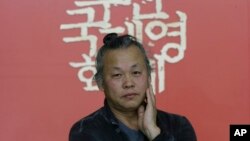For the past two decades, South Korean maverick filmmaker Kim Ki-duk's low-budget movies have given him international acclaim, highly coveted awards and many controversies.
Now, one of the most accomplished and critically acclaimed Asian directors is turning to China to make his first multimillion-dollar film.
Kim recently signed a $24 million deal with a Chinese production company to make an epic war movie with Buddhism as a central theme, with another $6 million set aside for marketing.
"This movie is not just targeting the Chinese market. The subject will interest the U.S. and Europe as well," Kim said in an interview at the Busan International Film Festival. "I want to talk about how politics manipulates religion."
Although religion inspired many of his previous works, the new project will be an outlier in Kim's career. The budget for the movie, written by Kim and tentatively titled "Who Is God" in English, is nearly three times bigger than the sum of the budgets for all of his 21 other films. It will be his first time working with a full Chinese cast in a Chinese language movie.
The staggering growth of the Chinese movie industry has been irresistible to many South Korean movie directors. But Kim, who visited Busan with his latest work, "Stop," said it was not the commercial success that attracted him to China. It was the film set and the filmmaking system in China that appealed to him at a time when he felt worn out and alienated from the South Korean movie industry.
"I'm too exhausted. It was so hard to make 'Stop' alone," the veteran moviemaker said. "Now I just want to sit on a (director's) chair and look at the monitor."
When he saw the Chinese film set, with each director sitting before a modern 60-inch monitor, he thought: "This could perhaps let me make the most of my ability."
"Stop," the story of a young Japanese couple conflicted about a pregnancy after moving to Tokyo from an area near the disaster-struck Fukushima nuclear plant, was filmed entirely by Kim, with no cinematographer, no art director and no lighting technician. He made props in the morning and filmed in the afternoon, while the actors served as their own costume designer and offered their homes for the film set. Costing less than $10,000, it was filmed in 10 days.
"Stop" may not stand out for the profound insight into human nature that made Kim a top film director. Some critics called the work "amateurish" and "sloppy."
But the anti-nuclear energy movie will stand as evidence of Kim's attempt to find an alternative movie-making venue outside of the South Korean system, where the top three film distributors control nearly three quarters of the movie theaters. Without support from one of them, a Korean movie stands no chance of succeeding at the box office.
"To be popular in South Korea, one has to have three (elements): major investment, major distribution and a well-known actor," Kim said. "I have come too far away from those things."
Kim embarked on the solitary making of "Stop" after his previous work, "One on One," fell flat at the South Korean box office in 2014, selling just 10,000 tickets.
When Kim and actors from the murder thriller went to cinemas to meet audiences, they had to greet largely empty theaters. The spectacular failure happened only two years after Kim received big welcomes at home after he won the Venice Film Festival's top prize with "Pieta," a brutal story of revenge and redemption.
Feeling "so sorry" to staff and actors, he soul-searched to figure out why South Korean moviegoers had shunned his film. "Stop" was his ground zero, a do-over.
"It was ruthless training," he said.
Kim may be weaning himself off the country that never seemed to have loved him. Growing up, he received little schooling beyond primary education, spending his teenage years toiling at factories, while envying kids in school uniforms.
Although he became an internationally acclaimed director — his earlier works "Spring, Summer, Fall, Winter ... and Spring" and "Three Iron" still inspire young filmmakers around the world — at home he hasn't enjoyed the popularity or reverence reserved for peers such as Park Chan-wook and Bong Joon-ho.
Many Koreans, especially females, say Kim's works are too difficult to watch because of their brutality and grisly details of violence, rape and castration. Kim said that top Korean movie stars and K-pop stars are reluctant to join his projects.
Kim, the willful outsider, said he wants to stop telling stories as a Korean and wants to deal with issues concerning humanity.
"Removing prejudices between people and class," he said. "I think that's the cinema's goal."




